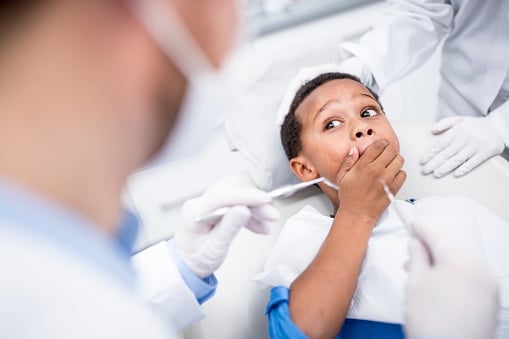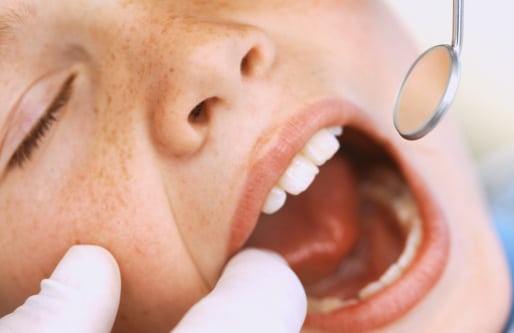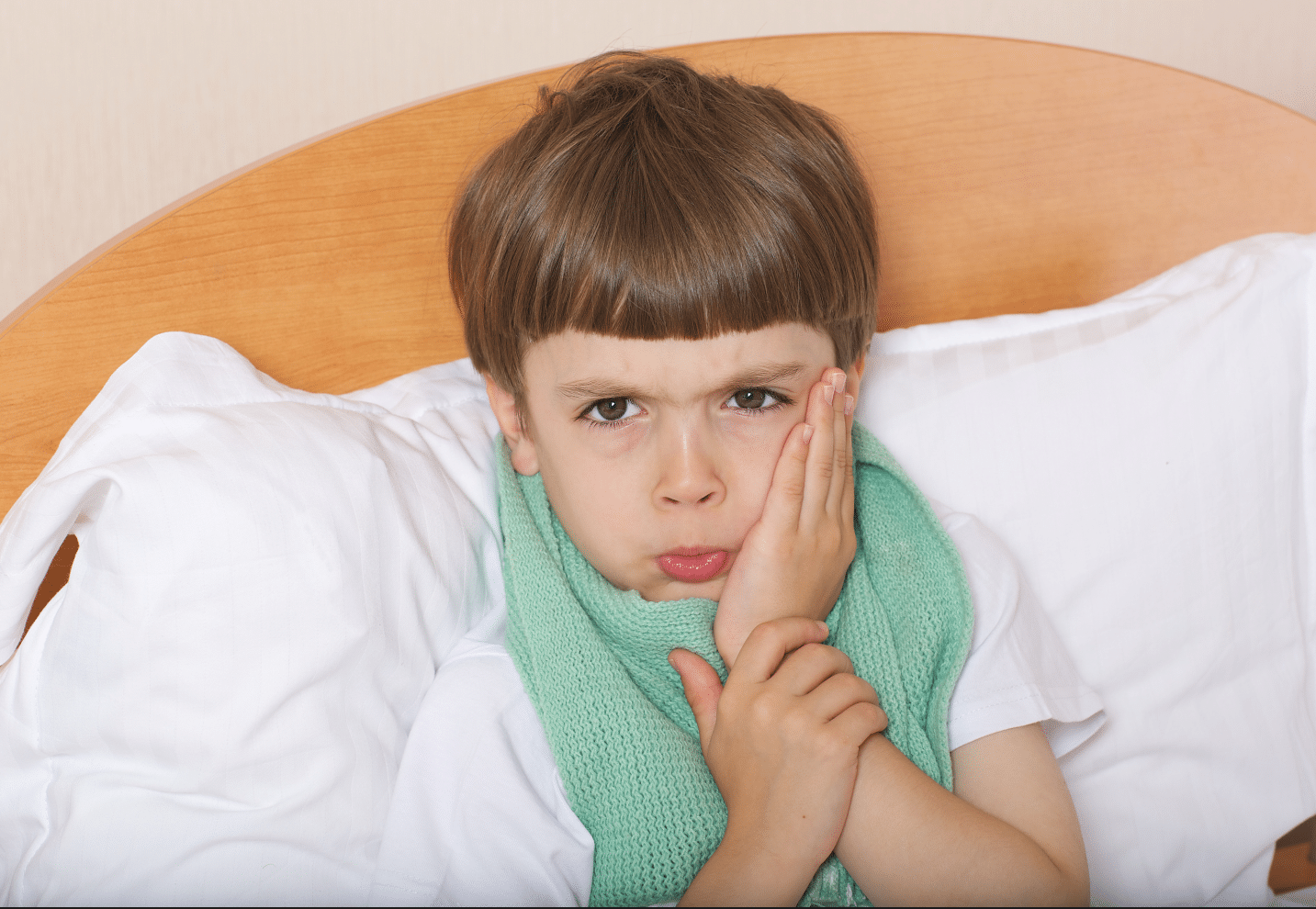Dentally Anxious Patients
You hate seeing dentists. Your heart starts racing when you pick up the phone to make the dental appointment you need. Even before they pick up the phone you go hot and cold. The appointment was for consultation only. There was no treatment. But you start to hyperventilate and feel like you’re going to have a fight with Mike Tyson! In the treatment room, you are in a half-laid-back dental chair. You feel out of control, and with ceiling lights in your eyes, things in your mouth and you feel helpless. You can’t control your emotions and end up in tears. You are thinking: “You know what! Maybe it’s best to have all my teeth out and replace them with a denture. That way, I can’t get a toothache anymore!” And others? Your friends and family don’t appreciate your dental anxiety. You are afraid that they may see you as an inferior or a weak person. They don’t understand you.

What is Dental Anxiety?
Dental anxiety is the apprehension of a patient when confronting dental matters. This apprehension can be excessive. It can significantly affect the patient and the dental care providers.
Dentally anxious patients may experience:
- increased heart rate (physiologic)
- anticipate painful treatments (cognitive)
- prefer to delay making dental appointments (behavioural)
How Common is Dental Anxiety
It is estimated that 1 out of 6 or 7 patients are dentally anxious. Anxiety and fear, often walking hand in hand with dental visits, find themselves out of a job under general anaesthesia. It’s not just about not feeling pain. It’s about not feeling the fear of it. For someone who shakes at the thought of a dental drill, this can be a turning point. Sleep dentistry doesn’t just make treatments bearable; it makes them disappear momentarily, along with the patient’s awareness.

What Causes Dental Anxiety?
Dental anxiety is a multifaceted Problem. It has no one common single causal factor but it can typically be triggered or caused by:
- Anticipation of pain
- Feeling helpless and loss of control
- History of traumatic or negative experience in childhood
- Bad stories or fearful friends
- Influence of dentally anxious family members
- Sight or sound of dental instruments e.g. air turbine drills, syringes, etc
- Angry, aggressive or impatient dentist or staff
The Biggest Barrier in Front of Dental Care
Dental anxiety and its subsequent avoidance of dental care has been shown to have strong association with poor oral health in both adults and children. According to Pure Dentistry Dentist Carindale , the most common reason for deferring or avoiding dental appointments is dental anxiety.
Patient Anxiety: A perpetual Source of Stress on the Dentist
Reducing dental anxiety has been a concern and topic of discussion in many dental clinics. Anxiety of the patient can put mental pressure on the dentist, cause the dentist to run late and lead to delay in seeing the next patients. This can mentally drain the dentist, make the day stressful for the supporting staff and cause other problems throughout the day including arguments between staff, patients and dentists. There are some techniques to manage anxiety in patients but they have disadvantages. The disadvantages include:
- Some anxiety management techniques are time-consuming
- Some are expensive
- Some require a lot of training and learning
- And some are limited by the medical conditions of the patient

Dental Anxiety is a Widespread Problem
Even some dentists have anxiety about dental treatments. Have you ever noticed some good dentists who have no good teeth? Dental anxiety is detrimental to dental health because fear creates a barrier against optimum oral health. Recent research shows that people who are more afraid of dentists usually have more missing teeth and fewer fillings compared to those who regularly attend dental care.
What Others Think of my Dental Anxiety
Dental anxiety is an emotional state that can affect people of all ages. This problem is quite common and has been found to be more prevalent in females than in males. Dental anxiety is a complex phenomenon. It is complicated because it is not just related to the dental treatment itself. It is sometimes to do with the opinion of others. Some dentally anxious patients feel that they are perceived as weak by others because others usually lack an appreciation of their anxiety.
Negative Impact of Dental Anxiety on Oral Health
Fear of visiting the dentist or paediatric dentist (for children)is important because it can have a negative impact on the oral health of both adults and children. Dental anxiety can make someone prefer tooth extraction over having to visit the dentist repeatedly! There are anxious patients out there who believe, “If I had my way, I would have replaced my teeth with dentures because they are easier to keep clean, and I can’t get toothache anymore”!
Need for Dental Specialist Services
Severe forms of dental anxiety are more commonly found in females. This means that anxious women may avoid dental care as a result of their anxiety which puts them at a higher risk of dental disease and poor oral health which leads to an increased reliance on more expensive specialist dental services or dental emergency services.

Scale of Dental Anxiety in Patients
Fear and anxiety in patients can range from slight feelings of unease during treatment to extreme anxiety long before the treatment. Therefore management techniques also range from supportive communication and establishing trust and rapport to the use of systematic desensitisation. An anxious patient may still see a dentist despite his/her fear. A dentally-phobic patient avoids seeing a dentist altogether.
Problems Caused by Dental Anxiety
Problems caused by dental anxiety affect people’s lives in their personal relationships and also professional relationships in the workplace. Including:
- Problems with social activities e.g. catching up with friends
- Family relationships
- Relationships at work or school
- Reduced ability to chew and avoiding hard food or cold food to avoid the need for dental treatment
- Several years of non-attendance
- Infrequent attendance
- Failing to attend pre-booked dental appointments despite acute toothache
- Overdosing on painkillers
- Needing to take the whole day off for a simple dental treatment
Dental anxiety can lead to some form of over reactions. This includes brushing too hard on the teeth and gums, changing the toothbrush too frequently, buying too many toothpastes or mouth washes. Some nervous patients need to be accompanied in the surgery they ask their partner or children to be present in the treatment room. On the other side, there are anxious patients who conceal their dental anxiety and try to appear brave in front of the kids.

What Triggers Dental Anxiety
Factors that can trigger anxiety or increase dental anxiety include:
- Patient anticipation of pain
- Accidentally getting hurt during dental procedure
- Feeling of choking during treatment
- Feeling of gagging during treatment
- Feeling loss of control
What Causes Dental Anxiety
Anxiety is a normal reaction against threats, however, anxiety disorder is a dysregulation of these normal reactions. Research shows that dentally anxious patients tend to overestimate the pain they would feel during the dental treatment.
According to a Brisbane kids dentist, dental anxiety could be related to:
- The influence of a dentally anxious family member
- A previous traumatic dental experience (for a family member or in childhood)
- Previous painful treatment, fear of pain or blood-injury fears
- Personality characteristics
- Not being familiar with the dentist or infrequent visits
- Long wait in the waiting area (layout and design of the waiting area matters)
- Smell or sound of vibrating drills experienced through the teeth and bones
- Sound of moaning patients
- Family history of previous negative experience
- Sometimes tilted-back chair position
- Noise from the dental handpiece
- Waiting too long in the waiting area overthinking the worst case scenarios
- Sight of needles used for the injection of local anaesthesia
- Gag-inducing procedures
Vicious Cycle of Dental Fear
According to Brisbane Dental Sleep Clinic, because of avoidant behaviours in dentally fearful patients, their anxiety can lead to the inability of the patient to accept necessary dental treatment. This leads to feelings of shame, weakness or inferiority which results in greater anxiety in the patient and further avoidance. Consequently, the problems worsen, and the need for more complex treatments increases.
Diagnosis of Dental Anxiety
In general, dental anxiety manifests itself with either deficient or excessive response. Diagnosis of dental anxiety can be challenging because there is no standard criteria for the diagnosis of dental anxiety in patients. Usually the diagnosis of dental anxiety is based on the clinical judgement of the dentist.
Signals that may be used for initial diagnosis include:
- Patients who have not visited the dentists for more than 2 years
- Patients with an irregular dental attendance
- Patients who skip or cancel appointments
- Patients who require longer time for dental treatment
- Poor compliance with follow-up treatments
- Patients who hesitate making dental appointments
- Patients with feelings of shame and inferiority
- High caries can suggest avoidance due to dental anxiety
- Missing teeth and few fillings
- Patients who use general medical services and overdose painkillers and antibiotics to avoid dental treatments

Solutions for the Management of Dental Anxiety
Successful management of dentally fearful patients requires a high level of understanding, communication skills and a phased treatment approach.
Dentally Anxious patients can be uncooperative and use of patient friendly equipment of techniques can provide benefit to these patients. Removal of sound healthy dentine can be painful. With Chemo Mechanical caries removal technique, selective caries are removed from carious dentine and therefore painful removal of healthy dentine is avoided.
Carisolv by Straumann
Use of dental bur in high-speed or low speed handpieces allow for fast restorations, however, burs used in these rotary handpieces cause vibration and may contribute to discomfort and anxiety.
For dentally anxious patients, attention to patient comfort is of utmost importance. Carisolv by Straumann is a method of caries removal which removes infected tissues of the tooth by gentle excavation and leaves healthy tissue intact. It does not affect healthy tissues and avoids pain and consequently fear. It has been developed for minimal invasive dentistry. With this method, dental anxiety caused by the vibration of rotary handpieces is also avoided. This technique is usually more expensive because it takes longer, however, it provides more comfort to the patient and it is also quite conservative and effective for caries removal.
Chemo mechanical caries removal, is considered a non-invasive method of removal of caries. In this technique a chemical agent is assisted by mechanical force to remove soft caries. Hard healthy dentine is preserved which avoids painful sound dentin removal.
Nitrous Oxide
Nitrous oxide has anxiolytic properties and it is of great clinical interest because of its indisputable effects on the nervous system. This medical gas is a popular dental anxiolytic among dentists. It has been used successfully in dentistry for around one and a half century for the treatment of dentally anxious patients, including both adults and children. Nitrous oxide is suitable for moderate anxiety. With extremely anxious patients, dental treatment under general anaesthesia in the hospital environment may be recommended by the dentists. This situation is common with babies or toddlers who typically do not cooperate in the dental chair. See Laughing gas for children in Brisbane and Sleep Dentistry for Kids.
Air Abrasion
Air abrasion is a new technology for conservative caries removal. Using this technology, painless caries removal become possible when the caries are detected and diagnosed early enough.
Ultrasonic Instruments with Diamond-coated Tips
Ultrasonic bur with diamond coated tips is a type of bur that is supposed to cut only into infected dentine and not take away affected dentine. It is more conservative in protecting the pulp in deep carious lesions.
Dental Team
Interactions between unskilled dental teams and dentally anxious patients can also trigger or increase the anxiety in patients. Important aspects of such interactions include unintentional statements made by an impatient, angry or tired dentist.
Dental team should be as sympathetic as possible with a dentally anxious patient. Dental team should be careful to keep from making patients feel guilty for being anxious.
Dental Anxiety may be triggered or increase by the dental care givers, through:
- Bad communications skills
- Condescending marks
- Bad manners
- Non-supportive unfriendly staff

Dental Treatment for Patients with Dental Anxiety
Treatment of dentally anxious patients can be challenging. Treatment for anxious patients requires more time and resources. Therefore, they usually require longer appointments. For these patients the dental team should minimize anxiety triggers and try to relax the patient by:
- putting dental instruments out of sight
- Use of favourite shows for children
- virtual reality glasses for adults
- Use of peristaltic injectors (Wand) for efficient administration of local anaesthesia
- Topical creams (EMLA)
- Conscious sedation using happy gas
- Calming manner of the dentist
- Friendly staff who provide moral support
- Relaxation and breathing techniques
Virtual reality headsets usually do not help much with dental treatment for children, Brisbane Kids Dentist says. Children usually respond better to simple distractions.
Over the past decades, dentists have been routinely using hand excavators and rotary drills to remove caries from the dentine. This conventional technique has some drawbacks which include:
- Annoying noise from the rotary air turbine
- Sensitivity of vital dentine
- Adverse thermal effects at the cutting surface
- Risk of overpreparation of the cavity
Dentists have been using local anaesthesia to ease the pain and discomfort associated with using rotary drills.
Replacement of conventional restoration methods (injection of local anaesthesia, air turbine rotary drills) with alternative restoration methods (air-abrasion and Carisolv gel) may help the anxious patient. Research shows that most people are concerned about the injection/drill technique because of:
- Discomfort of injection
- Taste of anaesthesia
- Long numbness after the treatment
- Noise and bone-conducted vibration of the drill
On the other side most people were not concerned about dust or the discomfort produced by air-abrasion and Carisolv gel.
How to Control Dental Anxiety
Dental anxiety can lead to the progress of the disease to a stage too late for any conservative treatment. Reducing the anxiety at its source is better than distraction.
Do not keep pondering the worst-case outcomes
- Use a dental clinic who has trained staff to be supportive of dentally anxious patients
- Avoid anxiety-provoking activities
- Find a dentist who takes active measures to reduce your dental anxiety
- Find a dentist who is patient and allows you to interrupt the treatment for a comfort break
- Find a dentist who can use electronic anaesthesia
- Find a dentist who can use air abrasion for caries removal
- Find a dentist who can use nitrous oxide
Some dentists allow patients to raise their hand to signal requests for a comfort break during long dental treatment.